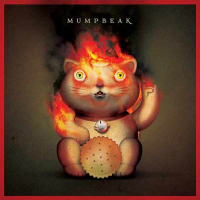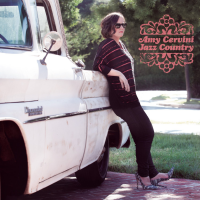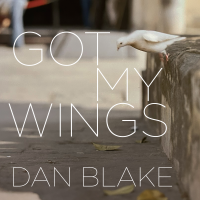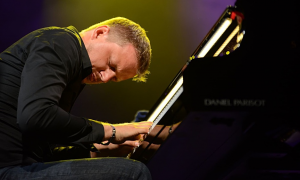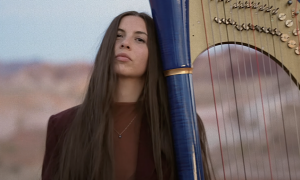Home » Jazz Articles » Interview » Wadada Leo Smith: I'm A Dreamer
Wadada Leo Smith: I'm A Dreamer
AAJ: To talk about the European premiere here in London, obviously the Ligeti Quartet has a different configuration compared to the nine piece South West Chamber Ensemble. How have you integrated them into the work?
WLS: Well, basically the Golden Quartet can play all twenty four pieces. It's not like the record, but it has all those elements in it. So that's the first thing that's important for me: if I can't get both ensembles, then the Golden Quartet can take all three days, just us. To have a string quartet in it gives that double ensemble quality to it, and makes it more thoroughly performed. And we've done that a number of times. But just recently in D.C. I added the timpanist to it, so now Pacifica Red Coral has a string quartet, a harp, and percussionist. The only thing I'm not going to add is the flute, the clarinetist and the other double bass, because I can get everything that we have here. From time to time Anthony Davis, this brilliant artist, like last night in "JFK" bless him, he played his part, the harp part, and the flute or the clarinet part. People don't know what a fantastic job he did, but he had to play all those parts, and he does it! Because when we do it as just a quartet he plays them all. So we've got everything covered right there. With the string quartet, as here, we don't have the harp, so he's playing the piano parts and the harp parts as well.
AAJ: So they are picking up the string quartet elements?
WLS: Exactly, but he's playing those other parts. So it's a full presentation of the musical sound of Ten Freedom Summers. We don't have those three other instruments, because now we've made it so we don't need them. The premiere it was important for it to be like that [the full ensemble], but after the premiere this piece don't ever need to be recorded again. It's fixed and it's set and it's a great achievement as an object. So the version I'm playing now, people are being exposed to the same version but from a new point of view.
AAJ: I've listened to the recording a lot, but last night I recognized some parts but there was a lot that was different.
WLS: There's lots of new parts. Like for example last night, nobody knew it because I don't decide what I'm going to do before I get on stage, in "Thurgood Marshall and Brown vs Board of Education" usually we go directly from the drum and trumpet intro into the theme of the piece, but last night we opened up that entrance completely and stayed there. And then in the latter part of it after the theme we opened it up again. Usually in the second part of it we do a collective, but I brought Anthony [Davis] and John [Lindberg] into it and as a trio explored that. That's how those pieces work live. They become blown up in a very different kind of way. The unique part of it is that the person who's come there to hear it live, they get a treat. If they have the CD, they get an extra treat, because they get this version and they've got the CD version. It's not a carbon copy from the CD. That's what being creative is about.
AAJ: So you are orchestrating on the spot?
WLS: On the spot, yes.
AAJ: And even the Golden Quartet don't necessarily know what's going to happen?
WLS: No nobody knows.
AAJ: You keep them on their toes.
WLS: Yes. In the Golden Quartet, John has been with me since he was nineteen. Anthony has been with me since he was eighteen. Anthony Brown is new. Jesse [Gilbert—video artist] has been with me fourteen years.
AAJ: So it's like family.
WLS: Like family. The interaction we see with images, Jesse and I started exploring those ideas ten years ago, and he had no idea he was going there. I could have told him but he wouldn't have listened to me. [laughs]. Jesse's history is that he plays clarinet, saxophones and ewe drumming. We're studying ideas and he comes in with these really diverse questions. And one day he called me and said I think I've got what it is. I went to a performance he did with a dancer and I see this stuff and said: "Wow!"
AAJ: It's great to have someone doing the visuals who has a musical background. Because many times you see the focus on the wrong thing because they don't have that awareness.
WLS: Exactly. Also the intellectual range that incorporates that material. All those images I don't select them. He does. He looks for them and selects them. So it means that the music and the images is a collaboration. But he doesn't put just any image up. He has to make it fit in the historical context and he has to make it work in the scheme of each piece.
AAJ: I assume that you've needed rehearsal time with the Ligeti Quartet?
WLS: We started rehearsing the day I got here. We rehearsed like five hours. And then the next night from seven to eleven. And yesterday we rehearsed before performing from about three to five. And we did some sound check stuff as well. All of this keeps adding to the mixture, making it possible to have the greatest possibility to present all this stuff. They are very fast and very courageous. They take the music to work on it. On Saturday they have scheduled themselves to have their own private rehearsal. So that shows what kind of ensemble that is. Originally [Cafe] Oto wanted to put together a string quartet from people they knew and I resisted that idea, because you cannot put together a string quartet to play this music. Or a band to play this music, that's not a standing band. Because to play the string parts they have to know how to bow together. You can't have one on a down stroke on the bow and another on an upstroke, because the sound is going to be different. So they have to work out the bowing pattern with each other. And in the nuance of playing together, if they haven't played together you can't develop that over the course of five or six rehearsals. You develop that over several years of playing. So it took them a while to get that in their head but I kept saying that if you can't find a string quartet we will do it just as the Golden Quartet and video, but I would prefer to have it with the string quartet and harp. But they couldn't get the harp. If I'd known that in time enough, I would have found a harp. But the Ligeti Quartet is a standing ensemble that plays together and they've already told me that they are going to add some of the string quartets to their repertoire. They are quality players and they listen very well and they are able to pick up information really fast.
AAJ: And they improvise as well. Has that meant that you've been able to push them a bit more?
WLS: Yes. Like for example in "Democracy" I heard them improvise and I knew during the rehearsal that I was going to include them. So I turned to them and said: "Number four." And boom. They had to improvise because they hadn't got no music in front of them. And they do it and it comes out fine. I left them and the piano. That was fantastic man. Those things, you can't rehearse them. They have to come in because of how you are feeling about the music. I'm like the chef. All the spices are there and all the things to make something beautiful happen. So I'm deciding on the spur of the moment how many drops of pepper to put in there. I can't decide before, because if I do it's not going to work. And the performance lifts me too. I'm inspired. I hear stuff that needs to be added here or over there. I'm hearing it now so I need to put it in now. I can't figure it out beforehand. So having an ensemble that plays together and has skills of improvising together makes it possible for them to play Ten Freedom Summers. Because any string quartet could not play it. The New York string quartet looked at two of my string quartets and they declined to play them. They inquired if they could play them but when they saw what was there they didn't think they could do it. Now they are a great ensemble, they have a long powerful history. They should have talked to me, but they didn't. If they had talked to me I would have put them at ease and told them that they could play it. All they've got to do is just trust me and themselves.
AAJ: Do you have the pieces in conventional notation?
WLS: They are not conventional. They are non-metrical. The full ensemble score is in view at all times. Not parts, because parts you can't see what other people are doing, and since there is no counting you cannot possibly know what the other person is playing or when they come in. So it's visual and it's a journey where you have to resist counting and traditional ways of representing those lines. So you've got notes there but it's far from that idea where you say:1, 2... I'm mostly cueing what I do, I'm not counting.
AAJ: It's very obvious when observing the performance that you are very hands on, always adjusting and changing.
WLS: Right, right.
Working in the UK
AAJ: I'd like to talk about working with UK musicians. Did you first come to London as part of one of Derek Bailey's Company weeks?
WLS: That was my first introduction here.
AAJ: Was that in about 1977?
WLS: Yes in the '70s. That was a great experience. I got a chance to meet a bunch of guys—Steve Lacy, I had met before, but I got a chance to play with him more and more. I had done a duet with him before then, but I got the chance to play with Steve Lacy who was a really fantastic guy. Beautiful man. Derek [Bailey], Tony Oxley and Johnny Dyani, and all those South African guys, though they wasn't playing in the event but they came. The first night I played there the South Africans came in a group. Every time I touched my horn or blew a note they would stomp and they would [makes trilling sounds]. Every time! It was explosive. I wrote about this in one of my CDs on TUM. But that initiation that they gave me on that Company event, some of the guys hated it, because they thought it was disruptive. But it was deeply African. They were really celebrating their brother from across the waters that they had missed for three hundred years. People don't know that. They were celebrating a reunion that you could not be a part of except if you know that tradition. That was quite an honor to tell you the truth. That whole thing brought me in contact with Evan Parker, and all the guys, [cellist] Tristan [Honsinger], and we could play with anybody we wanted to, so it made it really beautiful. Company was a great idea that really explored, I want to say, orchestration of different components as opposed to a grand idea. It was this notion of how do you orchestrate? All the ensembles were fixed either the night before or the day of the performance, who was going to play with who. It wasn't completely fixed by Derek, even though he would suggest a lot of them, but we also could suggest who we wanted to play with in addition. So all these things would be tagged up in the back as to which group we all have decided to play with. The beautiful thing was the notion of orchestrating different kinds of ensembles, as Anthony Braxton, me, and George Lewis, as we became part of Company in succession from the American school, all of us had experienced the idea of playing free and collective before—it wasn't new to us. But it was a grand experience and I thoroughly enjoyed it. I went on that big tour that they got through the Arts Council, to Scotland and Wales, about a fifteen day tour. There was some great music but there wasn't really an audience in those places because it just wasn't cultivated at that time. But the camaraderie between the players and performers was just exciting.
AAJ: So you built connections from there. You mentioned the South Africans, is that when you first met Louis Moholo-Moholo? You've played several times with him recently.
WLS: Not in that context, but I have subsequently. I love Louis. In fact I wrote a piece for him, and for Johnny Dyani, that hasn't been recorded yet. The one for Louis, he recorded it and I'm waiting to record it myself.
AAJ: I heard about one of the Freedom of the City festival appearances where you did a trio with Louis Moholo and Steve Noble, and several people said that was one of the best things that they had ever heard. The BBC tried to record it but it didn't work.
WLS: It was tragic that they didn't get it. But that was fantastic. I would love to do that idea again. I think Louis is still living in South Africa, because he went back there, so it makes it much harder because it is a very long flight.
AAJ: He comes over for a small part of each year. In fact he was playing at the Vortex with Alexander Hawkins earlier this week.
WLS: It would be nice to see him. We have a great record on TUM [Ancestors (TUM Records, 2012)]. And we did four or five performances, in Spain, France and Portugal in the Azores. Unfortunately since the CD came out we've had people interested, but nobody has come up with a program for us, which I find pretty tragic. The thing that deters them is that it's a long flight from South Africa to here and you can't ask Louis to come all the way to play just one job. We need more. My flight from California is not as long, but it's still twelve hours or so. It makes it very difficult.
AAJ: You've become a regular visitor to London now, but was there anything between Company and now?
WLS: No, nothing. That's why last night I made the confession that last night was the first time I've presented my own project in the UK. That's almost 40 years.
AAJ: How did your return come about?
WLS: Well I started coming back because John [Chantler] at Cafe Oto would send me a note every once in a while saying that we would like for you to be in residence for two days. I thought about it and then I said, OK I'm going to be in Europe, I'll do it. I did the first one and I loved it because I could get any collection of musicians that I wanted. John Coxon [of Springheel Jack] became my buddy/co-producer because he knew all the musicians. Through email and talking on the telephone we would fix up all the ensembles. Because my thing was, if I'm going to do this residency, I would like to do at least two or three ensembles per night. So for the last residency I ended up doing three ensembles per night which means I get six different versions of this music out there each residency.
AAJ: So do you choose the musicians yourself?
WLS: John Coxon and I. John knows all the players. I'll ask about people. I asked for example about Lol Coxhill and he was part of it. And Tony Marsh.
AAJ: Had you already played with John Coxon in Springheel Jack?
WLS: Yes. In fact before Cafe Oto, John brought me here twice to play with Springheel. And I played in the Freedom of the City festival. So really my link has been John Coxon, who engineered my entrance here, and also Ten Freedom Summers. He's responsible for that as well. He's the one that pushed the idea to John at Oto.
AAJ: Just picking up on that, Oto is a great space and it has really built an audience.
WLS: It's a fantastic space and a great audience. They come to listen to the music.
AAJ: And the chance to witness a presentation like Ten Freedom Summers in that intimate space is amazing.
WLS: It is amazing. For us we always did it in big venues, where you are on a big stage and the audience is way out there. And then when it's over, a few people rush the stage and say hello, but at Oto many people come. I've seen them there before and they just come and start talking. It usually takes quite a while to get to the back because of the intimacy of it. We've never done Ten Freedom Summers like that so it was very attractive to think about.
AAJ: If you are working in those sorts of situations with musicians who are generally into free improvisation does that change your approach? Do you approach it differently?
WLS: No. Basically in each of the ensembles I become the connecting glue. The way in which it flows, I do it through my trumpet. I control it through the trumpet. I can also control it through just being there on stage. Because if you listen to all of the groups that I work with and you listen to them without me, it's a different music. So presence has something to do with it and the way I play also has something to do with it. I've had people come and tell me at Oto that they've heard these guys in similar constructions and they sound different. I don't say we are going to do anything. We get on stage and we do it. But I shape the way it makes it's curves and bends.
AAJ: And also the use of silence.
WLS: Exactly. That comes in as well because it's part of what I do. Somehow they end up being part of that as well. That tells you something about their creativity and ability to actually play the music with me in it. They make that adjustment, it's not just me, they also have to make it, and make it spontaneously. It's not figured out.
AAJ: Excellent. Thank you very much.
WLS: Thank you.
Selected Discography
Wadada Leo Smith & TUMO, Occupy The World
Wadada Leo Smith/Louis Moholo-Moholo, Ancestors (TUM 2012)
Wadada Leo Smith, Ten Freedom Summers (Cuneiform, 2012)
Wadada Leo Smith's Organic, Heart's Reflection (Cuneiform, 2011)
Wadada Leo Smith, Spiritual Dimensions (Cuneiform, 2010)
Wadada Leo Smith/Jack DeJohnette, America (Tzadik, 2009)
Wadada Leo Smith, Golden Quartet (Tzadik, 2000)
Henry Kaiser/Wadada Leo Smith, Yo Miles! (Shanachie, 1998)
Leo Smith, Divine Love (ECM, 1978)
New Dalta Ahkri, Reflectativity (Kabell, 1974)
Photo Credit
Jesús Moreno
Tags
Wadada Leo Smith
Interview
John Sharpe
Braithwaite & Katz Communications
United States
New York
New York City
Leroy Jenkins
Anthony Davis
Andrew Cyrille
Jack DeJohnette
Malachi Favors
Louis Armstrong
Pheeroan AkLaff
Susie Ibarra
Anthony Brown
Derek Bailey
Steve Lacy
Tony Oxley
Johnny Dyani
evan parker
anthony braxton
George Lewis
Louis Moholo
Steve Noble
Alexander Hawkins
John Coxon
Lol Coxhill
Tony Marsh
PREVIOUS / NEXT
Support All About Jazz
 All About Jazz has been a pillar of jazz since 1995, championing it as an art form and, more importantly, supporting the musicians who make it. Our enduring commitment has made "AAJ" one of the most culturally important websites of its kind, read by hundreds of thousands of fans, musicians and industry figures every month.
All About Jazz has been a pillar of jazz since 1995, championing it as an art form and, more importantly, supporting the musicians who make it. Our enduring commitment has made "AAJ" one of the most culturally important websites of its kind, read by hundreds of thousands of fans, musicians and industry figures every month.



